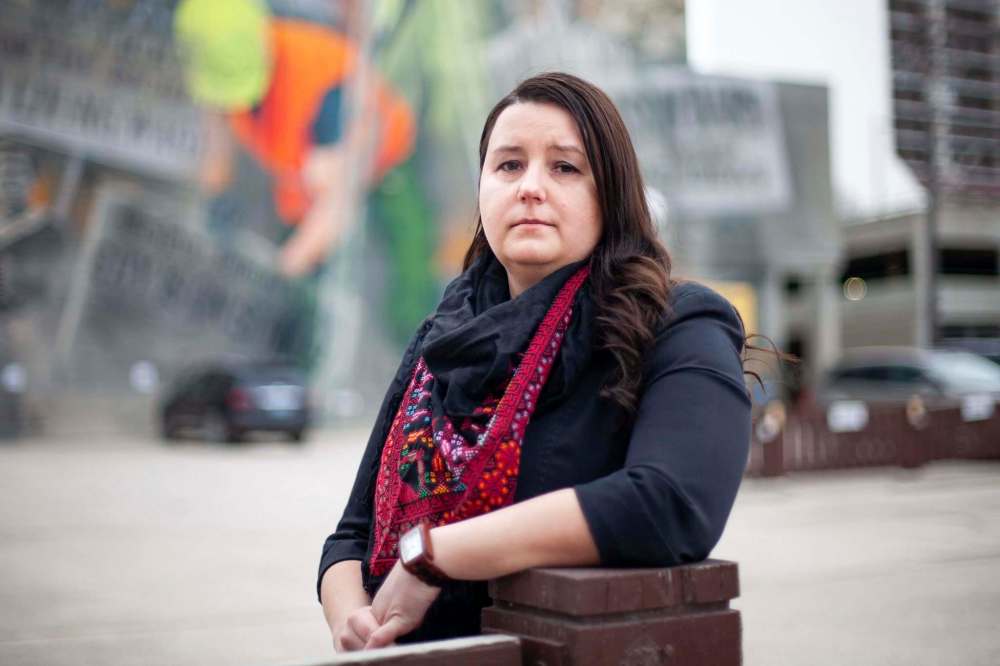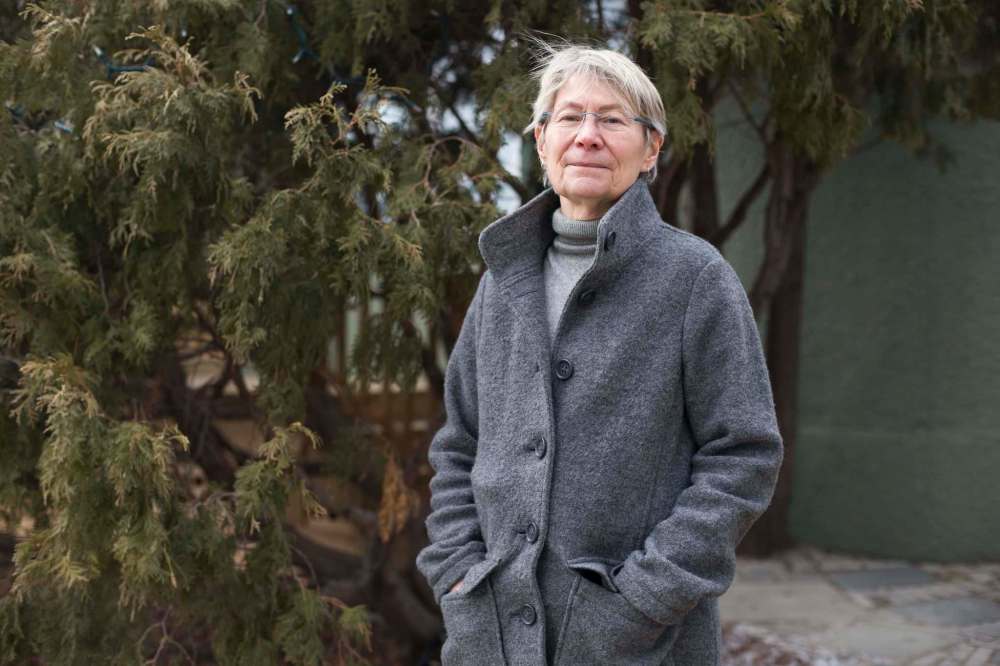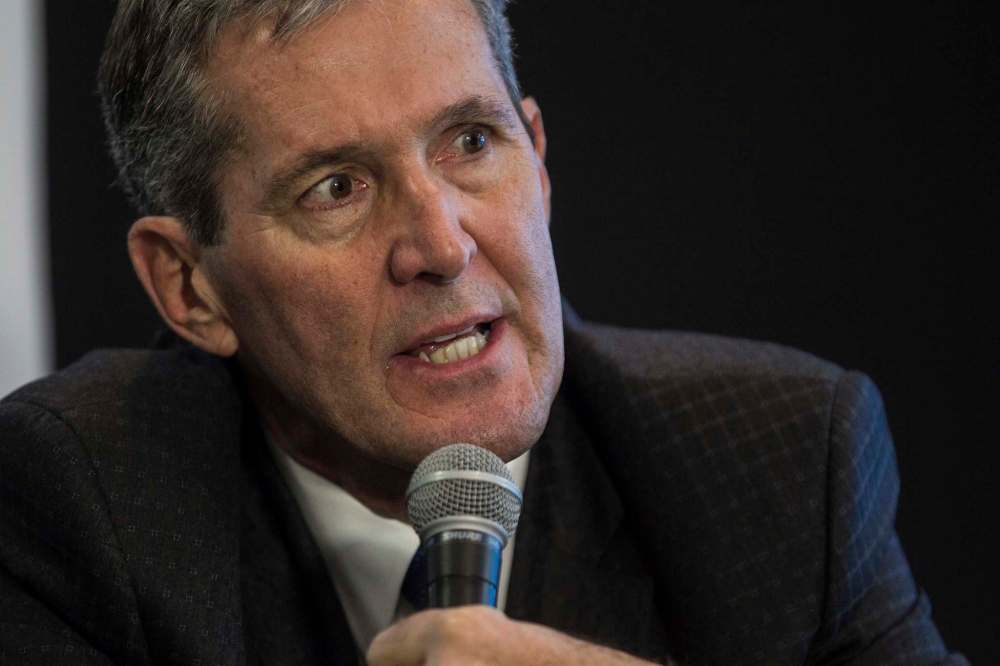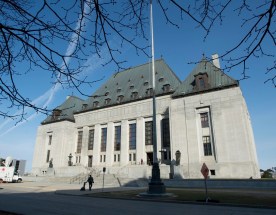Toxic state of the union Manitoba's organized-labour leadership taking steps to address long-festering sexist attitudes, behaviour and intimidation
Read this article for free:
or
Already have an account? Log in here »
To continue reading, please subscribe:
Monthly Digital Subscription
$0 for the first 4 weeks*
- Enjoy unlimited reading on winnipegfreepress.com
- Read the E-Edition, our digital replica newspaper
- Access News Break, our award-winning app
- Play interactive puzzles
*No charge for 4 weeks then price increases to the regular rate of $19.00 plus GST every four weeks. Offer available to new and qualified returning subscribers only. Cancel any time.
Monthly Digital Subscription
$4.75/week*
- Enjoy unlimited reading on winnipegfreepress.com
- Read the E-Edition, our digital replica newspaper
- Access News Break, our award-winning app
- Play interactive puzzles
*Billed as $19 plus GST every four weeks. Cancel any time.
To continue reading, please subscribe:
Add Free Press access to your Brandon Sun subscription for only an additional
$1 for the first 4 weeks*
*Your next subscription payment will increase by $1.00 and you will be charged $16.99 plus GST for four weeks. After four weeks, your payment will increase to $23.99 plus GST every four weeks.
Read unlimited articles for free today:
or
Already have an account? Log in here »
Hey there, time traveller!
This article was published 26/03/2021 (1716 days ago), so information in it may no longer be current.
The idealistic young labour activist’s enthusiasm for her first day of “union school” didn’t last long.
“When a comment was made about my ass in front of a number of (union) people, I thought, ‘What part of a code of conduct do you not understand?,'” she says. “What good are these things if we’re not going to uphold them?”
It was only Day 1 of the week-long training session in Russell in 2016, but the woman, who asked not to be identified, knew right then she had to advocate for herself because no one else was standing up and calling out the unacceptable behaviour.
“It felt like I was in a room with an abusive partner,” she recalls. “The language was hostile, threatening and intimidating.”
Stunning moment
A century after the 1919 Winnipeg General Strike for fair wages and decent working conditions, another stunning thing happened in the city’s labour movement.
The president of the Winnipeg Labour Council gave her resignation speech, saying she was subject to “degrading and disgusting actions.” Basia Sokal felt that she was tapped for president so that she “could be told what to do because it would look good to have a female president at the head, it would look great to have a woman in that position.”
A century after the 1919 Winnipeg General Strike for fair wages and decent working conditions, another stunning thing happened in the city’s labour movement.
The president of the Winnipeg Labour Council gave her resignation speech, saying she was subject to “degrading and disgusting actions.” Basia Sokal felt that she was tapped for president so that she “could be told what to do because it would look good to have a female president at the head, it would look great to have a woman in that position.”
Many more women would speak up if they weren’t afraid of the backlash in their workplaces, Sokal said.
Two years after her blistering resignation speech, she said she’s since received many messages of support, including a “troubling” one from a union “sister” who said she would lose her job if she spoke out.
“As a single mom with no support system, that simply wasn’t an option” for her — I don’t blame her for it,” said Sokal, a postal worker.
Many women working in male-dominated spaces simply can’t be seen with “trouble makers, crazies, etc,” she said.
And when they do join forces to call out problems, Sokal said they’re often accused of “airing dirty laundry” and “turning on your own.”
There’s many barriers to women speaking up, she said — “losing their positions on executives, being blackballed for not towing lines, the requirement to remain neutral, and even threats of losing their job (if it’s a staff representative position, for example) if they’re seen associating with certain women,” she said.
Tokenism happens on union boards, with LGBTTQ*, differently-abled, and women of colour being asked to run for executive positions without the union offering any actual support, said Sokal.
“Putting someone in a diversity seat just for show is not supporting women. The labour movement loves to brand political parties and employers with ‘tokenism’, but used the word ‘representation’ when it comes to themselves.”
Delegates to committees are often selected by male-dominated executives of locals, said Sokal.
“If you’re a trouble maker, your local likely won’t get you into those elite circles. In that way, it creates a real barrier for women to meet.”
Women can band together in small groups but often don’t have the time or space to really call out and address issues, she said.
“If we had a venue to support each other, we wouldn’t need all of these articles to call things out.”
Issues involving sexism and sexual harassment have long bubbled below the surface at Manitoba unions. But unions, much like other male-dominated institutions, such as the military and RCMP, are facing a moment of reckoning for allowing toxic culture and masculinity to fester in the workplace for years.
The severity of the situation in Manitoba gained prominence two years ago during the centenary celebration of the 1919 Winnipeg General Strike, which laid the groundwork for collective bargaining, fair wages and improved working conditions across Canada.
Instead, then-Winnipeg Labour Council president Basia Sokal resigned, saying she was subject to “degrading and disgusting” sexism and tokenism among union leadership.
Then in February, Manitoba’s largest public-sector union announced it would address years of complaints about sexism and misogyny after its president was charged with sexual assault.
Canadian Union of Public Employees Manitoba president Abe Araya was charged Jan. 21, forced to resign and the provincial executive council he led was dissolved. The sexual assault was alleged to have occurred in Brandon in February 2019 during a work trip. Araya, who is not in custody and is innocent until proven guilty, is scheduled to appear in court in Brandon on April 1.
CUPE Manitoba represents 36,000 employees in workplaces ranging from personal-care homes to school divisions to libraries to family emergency services.
“I care very much about us having a safe workplace and a good working environment. There’s no place in our union — and no place in our society — for (sexism and harassment).”–Lee McLeod
Before his election as president of CUPE Manitoba, Araya was president of CUPE Local 110, which represents about 400 custodians, maintenance workers and painters in the Winnipeg School Division.
There have been complaints about the behaviour of some members of that local dating back to 2016.
Some of Local 110’s membership could easily be mistaken for outlaw gang members; they’ve shown up at union events sporting biker-style black leather vests with “Loco 110” and “NO RATS” patches and tattoos and boast of using intimidation tactics on fellow members and making threats to an employer.
After Araya was charged, CUPE Manitoba told members that resolutions adopted to make union events safer were now a priority.
“It has brought this to our attention and now we know we need to do this work,” CUPE Manitoba regional director Lee McLeod says.
McLeod was appointed by the national office to take over the provincial office after the president was removed and the executive dissolved. He’s working to ensure issues of harassment, human rights and inequality are being addressed and training programs are in place before a new executive is elected.
“It is really sad to me that it’s taken an arrest and a criminal charge for our union to step up and make changes.”–Claire Friesen
“I care very much about us having a safe workplace and a good working environment,” McLeod the Free Press. “There’s no place in our union — and no place in our society — for (sexism and harassment).”
He assigned staff to review policies and procedures and is doing a full audit to have mandatory training, which will include “strong content on harassment,” ready for a new executive. The review is expected to take several months to complete.
Whether leaders take the training to heart is another matter, says one union supporter rooting for change.
“It is really sad to me that it’s taken an arrest and a criminal charge for our union to step up and make changes,” says Claire Friesen, a shop steward and previous education chair of CUPE Local 2348, which represents about 700 members working in the social-services sector.
“It is a culture, and when we think about cultures that are problematic and hostile it can be really hard to talk about a lot of things. It’s not always as overt as a sexual harassment complaint but definitely is something that really affects our involvement in the labour movement.”
She remembers her first union meeting with her local and hearing the CUPE equality statement, which is read aloud before every meeting.
“It sounds like they’re committed to safer-spaces training and anti-oppression training and that’s amazing, but this has been called on for years and years.”–Claire Friesen
“I was so excited to be part of something — a culture of striving to work with each other with a lot of respect,” she says. “It was quite a shock to find out the same standards are not held by other locals.
“I think being around a local that wears shirts that are designed to intimidate — leather vests and men who have tattooed themselves in this brotherhood way — is very intimidating. For me, it was very clear, very early on, that we had two sets of standards.”
When she was Local 2348’s education chair, Friesen took members’ sexual harassment complaints to the provincial executive, wanting to talk about the toxic culture and how to fix it rather than filing individual grievances. Nothing was done. She took her concerns to the national level. Nothing was done.
Friesen says she was contacted by McLeod last month and is feeling hopeful.
“It sounds like they’re committed to safer-spaces training and anti-oppression training and that’s amazing, but this has been called on for years and years,” she says.
“I can’t give up on the labour movement. I am interested in standing alongside workers and workers’ rights, and workers’ rights should include everyone.”
Creating an atmosphere of inclusion can be difficult when you’re circling the wagons to survive, says an expert on Winnipeg’s labour history.

“When an organization is under threat of extinction, it’s often hard for some leaders to see diversity issues as a top priority,” University of Manitoba history and labour studies Prof. Julie Guard says.
“Many of us argue to the contrary — that ensuring that all members, and indeed all workers, are represented equally and vigorously by unions is even more important now. But that hasn’t been the way unions survived in past decades and it feels risky for some leaders to try new strategies when unions are more vulnerable than in the past.”
Unions have been under “serious assault” since at least the 1980s, Guard says.
“The business establishment has largely withdrawn from the tacit agreement reached after the Second World War to accept unions as long as the unions promised to contain militancy and abide by the strict rules that limited what they could negotiate and how they could organize,” she said.
And the Brian Pallister-led Progressive Conservative government in Manitoba has been intent on weakening unions, she said.

In its first year in power in 2016, the Pallister government passed legislation that made it harder for people to join a union, Guard said. The PC government’s latest proposal would allow employers to fire workers for “strike-related misconduct,” eliminate the rights of striking workers to apply for binding arbitration after 60 days of strike or lockout, and require only 40 per cent of workers instead of 50 per cent to call for union decertification.
“Making it harder for people to join unions is really a step in undermining the labour movement in the province,” Guard said, adding unions need to be huge to have any bargaining power.
“You need to bolster the ranks when you’re in a war for survival. It’s a long-term trend.”
Some “dinosaurs” remain on union executives but there has been progress, said Guard. She cites as examples the 15,000-member United Food and Commercial Workers Local 832 in Manitoba and the Manitoba Government and General Employees Union.

UFCW Local 832 secretary-treasurer Bea Bruske is running for president of the Canadian Labour Congress. Bruske got her start with the private sector union in 1987 during the 164-day SuperValu strike and now serves on the national UFCW diversity committee. Manitoba Government and General Employees Union has a woman president, Michelle Gawronsky, who has become the public face of government workers challenging the PC government’s calls for austerity during the pandemic.
“Three decades ago, it was unusual for a woman to be a union president. Now it’s normal,” Guard said.
carol.sanders@freepress.mb.ca

Our newsroom depends on a growing audience of readers to power our journalism. If you are not a paid reader, please consider becoming a subscriber.
Our newsroom depends on its audience of readers to power our journalism. Thank you for your support.









